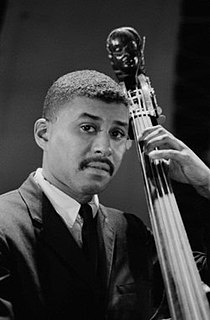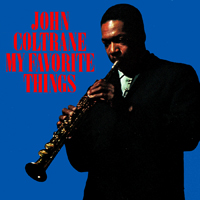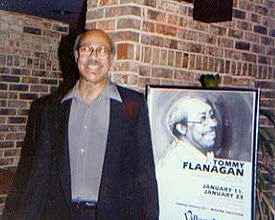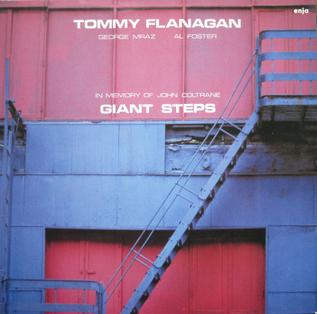Related Research Articles

John William Coltrane was an American jazz saxophonist and composer. He is among the most influential and acclaimed figures in the history of jazz and 20th-century music.

Paul Laurence Dunbar Chambers Jr. was an American jazz double bassist. A fixture of rhythm sections during the 1950s and 1960s, his importance in the development of jazz bass can be measured not only by the extent of his work in this short period, but also by his impeccable timekeeping and virtuosic improvisations. He was also known for his bowed solos. Chambers recorded about a dozen albums as a leader or co-leader, and over 100 more as a sideman, especially as the anchor of trumpeter Miles Davis's "first great quintet" (1955–63) and with pianist Wynton Kelly (1963–68).

Giant Steps is the fifth studio album by jazz musician John Coltrane as leader. It was released in February 1960 on Atlantic Records. This was his first album as leader for Atlantic Records, with which he had signed a new contract the previous year. The record is regarded as one of the most influential jazz albums of all time. Many of its tracks have become practice templates for jazz saxophonists. In 2004, it was one of fifty recordings chosen that year by the Library of Congress to be added to the National Recording Registry. It attained gold record status in 2018, having sold 500,000 copies.
Coltrane changes are a harmonic progression variation using substitute chords over common jazz chord progressions. These substitution patterns were first demonstrated by jazz musician John Coltrane on the albums Bags & Trane and Cannonball Adderley Quintet in Chicago. Coltrane continued his explorations on the 1959 album Giant Steps and expanded on the substitution cycle in his compositions "Giant Steps" and "Countdown", the latter of which is a reharmonized version of Eddie Vinson's "Tune Up". The Coltrane changes are a standard advanced harmonic substitution used in jazz improvisation.
"Giant Steps" is a jazz composition by American saxophonist John Coltrane. It was first recorded in 1959 and released on the 1960 album Giant Steps. The composition features a cyclic chord pattern that has come to be known as Coltrane changes. The composition has become a jazz standard, covered by many artists. Due to its speed and rapid transition through the three keys of B major, G major and E♭ major, it has been described as being "the most feared song" and "one of the most challenging chord progressions to improvise over" in the jazz repertoire.

My Favorite Things is the seventh studio album by jazz musician John Coltrane, released in March 1961 on Atlantic Records. It was the first album to feature Coltrane playing soprano saxophone. An edited version of the title track became a hit single that gained popularity in 1961 on radio. The record became a major commercial success.
"In a Sentimental Mood" is a jazz composition by Duke Ellington. He composed the piece in 1935 and recorded it with his orchestra during the same year. Lyrics were written by Manny Kurtz; Ellington's manager Irving Mills gave himself a percentage of the publishing, so the song was credited to all three. Other popular versions in 1935/36 were by Benny Goodman and by Mills Blue Rhythm Band.

Coltrane Plays the Blues is an album of music by jazz musician John Coltrane, released in July 1962 on Atlantic Records. It was recorded at Atlantic Studios during the sessions for My Favorite Things, assembled after Coltrane had stopped recording for the label and was under contract to Impulse Records. Like Prestige Records before them, as Coltrane's fame grew during the 1960s, Atlantic used unissued recordings and released them without either Coltrane's input or approval.

Thomas Lee Flanagan was an American jazz pianist and composer. He grew up in Detroit, initially influenced by such pianists as Art Tatum, Teddy Wilson, and Nat King Cole, and then by bebop musicians. Within months of moving to New York in 1956, he had recorded with Miles Davis and on Sonny Rollins' album Saxophone Colossus. Recordings under various leaders, including Giant Steps of John Coltrane, continued well into 1962, when he became vocalist Ella Fitzgerald's full-time accompanist. He worked with Fitzgerald for three years until 1965, and then in 1968 returned to be her pianist and musical director, this time for a decade.

Coltrane's Sound is an album credited to jazz musician John Coltrane, recorded in 1960 and released in 1964 on Atlantic Records, catalogue SD 1419. It was recorded at Atlantic Studios during the sessions for My Favorite Things, assembled after Coltrane had stopped recording for the label and was under contract to Impulse! Records. Like Prestige and Blue Note Records before them, as Coltrane's fame grew during the 1960s Atlantic used unissued recordings and released them without either Coltrane's input or approval.

Africa/Brass is the eighth studio album by jazz musician John Coltrane, released on September 1, 1961 on Impulse! Records. The sixth release for the fledgling label and Coltrane's first for Impulse!, it features Coltrane's working quartet augmented by a larger ensemble to bring the total number of participating musicians to 21. Its big band sound, with the unusual instrumentation of French horns and euphonium, presented music very different from anything that had been associated with Coltrane to date. While critics originally gave it poor ratings, more recent jazz commentators have described it as "amazing" and as a "key work in understanding the path that John Coltrane's music took in its final phases."

Coltrane Jazz is the sixth studio album by jazz musician John Coltrane. It was released in early 1961 on Atlantic Records. Featuring Coltrane alongside his former Miles Davis bandmates- pianist Wynton Kelly, bassist Paul Chambers and drummer Jimmy Cobb- with the exception of "Village Blues", a landmark recording in Coltrane’s career as it marks the first session of the classic John Coltrane Quartet with pianist McCoy Tyner, bassist Steve Davis and drummer Elvin Jones.
The Heavyweight Champion: The Complete Atlantic Recordings is a 1995 box set by jazz musician John Coltrane. It features all of the recordings Coltrane made for Atlantic Records, spanning January 15, 1959, to May 25, 1961.

Alternate Takes is a compilation album credited to jazz musician John Coltrane, released in 1975 on Atlantic Records, catalogue SD 1668. Issued posthumously, it consists of outtakes from recording sessions which yielded the albums Giant Steps, Coltrane Jazz, and Coltrane's Sound. All selections were unreleased at the time.
Atlantic Studios was the recording studio of Atlantic Records. Although this recording studio was located at 1841 Broadway, in New York City, Atlantic Recording Studios was initially located at 234 West 56th Street from November 1947 until mid-1956. When the Shorty Rogers and His Giants disc of 33.33 rpm called Martians Come Back! was issued in August 1956, the address of Atlantic Recording Studios had relocated to 157 W 57th Street. The studio was the first to record in stereo due to the efforts of Tom Dowd.
"Equinox" is a minor blues jazz standard by American jazz saxophone player and composer John Coltrane. Originally released on Coltrane's Sound played in C# minor with a slow swing feel. However, it is usually played in the key of C Minor and often covered on the flute.

The Best of John Coltrane is a 1970 compilation album released by Atlantic Records collecting recordings made by jazz saxophonist John Coltrane. The album was released shortly after his death as a part of the "Atlantic Jazz Anthology"—a series of greatest hits compilations for Atlantic jazz artists—and features performances from his brief period recording for Atlantic with new liner notes by jazz journalist Nat Hentoff.

Giant Steps is an album by pianist Tommy Flanagan recorded in 1982 featuring compositions by John Coltrane.
Blues in the Closet is a 1983 album by jazz pianist Tommy Flanagan, bassist Ron Carter and drummer Tony Williams, known collectively as The Master Trio.
"Countdown" is a hardbop jazz standard composed by American jazz saxophonist John Coltrane which was first featured on his fifth studio album, "Giant Steps", in 1960. The song is a contrafact of Miles Davis' Tune Up which is reharmonized to the Coltrane changes. The original recording has been described as having "resolute intensity. .. [that] does more to modernize jazz in 141 seconds than many artists do in their entire careers".
References
- ↑ Jazz, All About (1999-03-01). "John Coltrane: Coltrane's Sound album review @ All About Jazz". All About Jazz. Retrieved 2022-08-05.
- ↑ Coltrane, John (2013). John Coltrane Favorites Songbook Jazz Play-Along Volume 148. Hal Leonard Corporation. ISBN 978-1-4803-6891-0. OCLC 1152066745.
- ↑ "Giant Steps, Central Park West, and Modulatory Cycles - John Coltrane's harmonic technique". www.thinkingmusic.ca. Retrieved 2022-08-05.